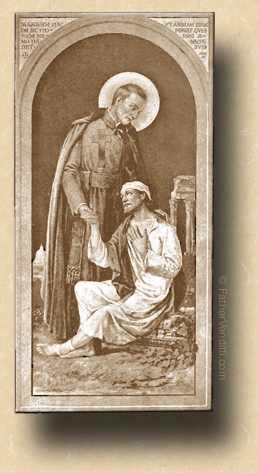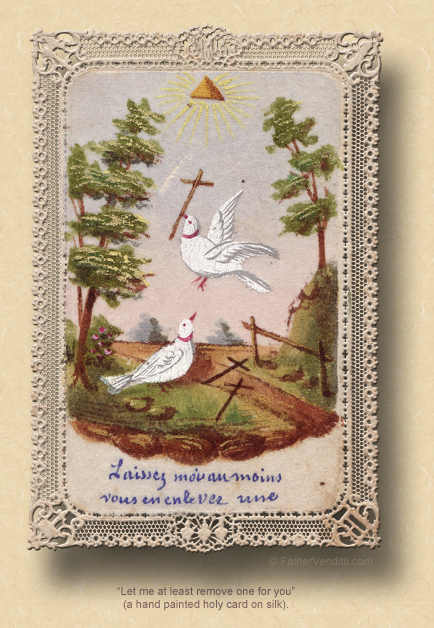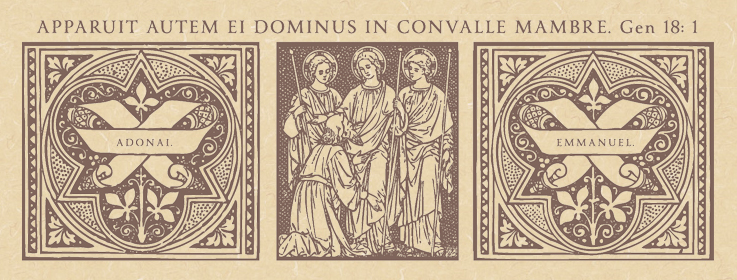Honoring the Overworked and Underpaid.
The Sixteenth Sunday of Ordinary Time.
Lessons from the tertiary dominca, according to the ordinary form of the Roman Rite:
• Genesis 18: 1-10.
• Psalm 15: 2-5.
• Colossians 1: 24-28.
• Luke 10: 38-42.
The Ninth Sunday after Pentecost.
Lessons from the dominica, according to the extraordinary form of the Roman Rite:
• I Corinthians 10: 6-13.
• Psalm 8: 2.
• Luke 19: 41-47.
The Ninth Sunday after Pentecost; the Sunday of the Memory of the Fathers at the First Six Ecumenical Councils; the Feast of the Holy Great Martyr Marina; the Feast of the Blessed Confessor Paul Bojdich, Bishop of Prešov.*
First & fourth lessons from the pentecostarion, second & fifth from the menaion for the Fathers, third & sixth from the menaion for the Martyr, according to the Ruthenian recension of the Byzantine Rite:
• I Corinthians 3: 9-17.
• Hebrews 13: 7-16.
• II Corinthians 6: 1-10.
• Matthew 14: 22-34.
• John 17: 1-13.
• Luke 7: 36-50.
FatherVenditti.com
|
 8:19 AM 7/17/2016 — Welcome to our first annual White Mass. And if you’re confused, it doesn’t refer to the color of the vestments worn by the priest which technically should be green, this being a Sunday in Ordinary Time; it refers to those whom it honors: it is a Mass offered for and with those who labor in the health care professions: nurses, doctors, orderlies, pharmacists, anyone who has dedicated themselves to the sick, and who has made the care of the sick their life’s work. These annual celebrations in honor of certain professions typically focus on whomever is the patron saint of those who work in those professions: the annual Red Mass, celebrated in some places and honoring lawyers, focuses on their patron saint, Thomas More; the Blue Mass for police officers on Saint Jude, their patron saint. Unfortunately, the White Mass is the least common, which probably reflects the current state of affairs for those who labor in the care of the sick: underpaid, overworked, always taken for granted; the kind of people we give no thought of until we need them, and then we just presume that they will always be there. 8:19 AM 7/17/2016 — Welcome to our first annual White Mass. And if you’re confused, it doesn’t refer to the color of the vestments worn by the priest which technically should be green, this being a Sunday in Ordinary Time; it refers to those whom it honors: it is a Mass offered for and with those who labor in the health care professions: nurses, doctors, orderlies, pharmacists, anyone who has dedicated themselves to the sick, and who has made the care of the sick their life’s work. These annual celebrations in honor of certain professions typically focus on whomever is the patron saint of those who work in those professions: the annual Red Mass, celebrated in some places and honoring lawyers, focuses on their patron saint, Thomas More; the Blue Mass for police officers on Saint Jude, their patron saint. Unfortunately, the White Mass is the least common, which probably reflects the current state of affairs for those who labor in the care of the sick: underpaid, overworked, always taken for granted; the kind of people we give no thought of until we need them, and then we just presume that they will always be there.
Equally overlooked is their patron saint, whose memorial is tomorrow, which is why I chose this Sunday for today’s observance. Many people have never even heard of him; and, even among those who have heard of him, all they usually know about him is that he is the patron saint of those who care for the sick; but, the remarkable story of his life contains lessons of enormous importance for all of us, no matter what we do for a living.
Camillus de Lellis was born in the province of Abruzzi in Italy in 1550. He was a soldier who was addicted to gambling; and, after his conversion to Christ he decided to become a priest and dedicate his life to the care of the sick, founding the Order of Ministers to the Sick. He died in Rome toward the beginning of the 17th century. And that's pretty much all that the “official” biography of him will tell you, sure in the conviction that the more rubicund details of a saint’s life are better kept from dear laity; but, those of you who know me know that I am not of that mind. The Breviary I use to pray the Divine Office every day is the 1960 revision of the one produced by Saint Pius X, allowed by Pope Benedict in Summorum Pontificum; and, on the feasts of some of these lesser known saints, that Breviary presents, in the lessons for Matins, some very detailed biographies of these people that, I suppose, the Church felt was OK to tell priests but that the laity didn't need to know. In the case of Saint Camillus, it goes into more detail about what happened to him after his conversion: he had initially felt called to enter the Capuchin Franciscans, and did—several times—and ended up leaving the Order several times. He suffered from a lot of health problems—which had attracted me to look into his life a little deeper, since I've been down that road myself as many of you know—and was in and out of the Order I think three times during this period. Eventually, he ended up in Rome where he was ordained a secular priest, and where he founded the Order of Ministers to the Sick, the mission of which was to care for plague victims without any concern for the safety or health of its own members.  A lot of people, during this latter plague, were reluctant to care for plague victims out of concern for catching the disease themselves, and he saw a need for some organization to care for these people without being hindered by concern for the safety of the members. He continued to suffer from health problems of his own, and finally died in Rome in 1614 at the age of sixty-five—not from the plague—and was canonized by Pope Leo XIII, who named him the Patron Saint of Hospitals and the Sick. A lot of people, during this latter plague, were reluctant to care for plague victims out of concern for catching the disease themselves, and he saw a need for some organization to care for these people without being hindered by concern for the safety of the members. He continued to suffer from health problems of his own, and finally died in Rome in 1614 at the age of sixty-five—not from the plague—and was canonized by Pope Leo XIII, who named him the Patron Saint of Hospitals and the Sick.
His life often reminds me of an Old Testament passage which, every odd year or so, actually coincides with his memorial, in which the Prophet Isaiah is sent to King Hezekiah, who is mortally ill, to tell him that he's about to die (cf. Isaiah 38: 1-22). Hezekiah is, of course, very distressed at this news, and begins to pray for his life to be spared; and, the Lord, having heard this prayer, sends Isaiah back to him to tell him that, because of the sincerity of his prayers, he will be allowed to live another fifteen years.
Now, theologically, we don't accept the notion that the mind of God, in His infinite wisdom, is changeable, but we do accept the notion that God will allow us to believe He's changed His mind in order to impress upon us the fact that He does hear our prayers, even when the answer we receive is not the one we want. God knew all along that He was going to save Hezekiah's life, but He didn't let Hezekiah know that. Hezekiah needed to be taken down a peg first; he needed to be forced to realize his dependency on God alone; so, God allowed him to believe that he was going to die.
Just like Saint Camillus: God knew all along what He was going to do with this man, but there was an element of pride there that had to be boiled out of him first; so, God allowed him to try and fail several times in his attempts to become a Capuchin. It was only after landing in the moral cesspool that was Rome in those days, depressed and dejected and thinking himself a total failure, that God led him to the secular priesthood—a vocation he had never seriously considered—and revealed to him the need to care for the city’s sick and dying.
It is an uncomfortable fact that our hopes and desires, no matter how holy, do not often coincide with the will of God. Back when I was young and foolish and a glutton for punishment, I use to do spiritual direction for nuns; and, when you're directing nuns it's not at all uncommon to run headlong into a solid wall of pride, where someone will be convinced that God wants her to do something when, in reality, it's what she wants, not what God wants. She can't see that because what she wants is a good and holy thing to do; but, just because it's good and holy doesn't mean it's what God wants for her. I often like to say that our soul is like a canoe on a spiritual river—which takes me back to my Boy Scout days—and where you see a particular island you'd like to explore, but the current of the river has other ideas; so, you paddle and paddle and paddle, but the current is just too strong, so you're basically just paddling in place without going anywhere, and it's only after you've worn yourself out and stop paddling that the river is able to take you where you were supposed to go in the first place.
 Today’s first lesson is the one we made such a big deal about way back the beginning of the summer on Trinity Sunday, in which Abraham extends his hospitality to three young men whom, we find out later, are actually angels; and, it’s only after they have left him does he realize that He whom he was really hosting was God, represented by three angels because God is three divine Persons: Father, Son and Holy Spirit. He doesn’t know who they are when they’re there; he only realizes it after they’ve gone and he’s able to reflect upon it prayerfully. Martha, in today’s Gospel lesson, may be more akin to nurses and doctors and the like more than anyone else in the Bible: always busy with this and that, always running here and there because there’s something or someone who needs her, and complaining about her sister who only wants to sit and listen to our Lord. When our Lord rebukes Martha, it’s not because her concerns are not valid; it’s because He doesn’t want her to fall into the trap of losing her perspective: of forgetting that, amid all the pragmatic concerns that seem to dictate every minute of her working hours, there is an eternal purpose that pertains to salvation. Today’s first lesson is the one we made such a big deal about way back the beginning of the summer on Trinity Sunday, in which Abraham extends his hospitality to three young men whom, we find out later, are actually angels; and, it’s only after they have left him does he realize that He whom he was really hosting was God, represented by three angels because God is three divine Persons: Father, Son and Holy Spirit. He doesn’t know who they are when they’re there; he only realizes it after they’ve gone and he’s able to reflect upon it prayerfully. Martha, in today’s Gospel lesson, may be more akin to nurses and doctors and the like more than anyone else in the Bible: always busy with this and that, always running here and there because there’s something or someone who needs her, and complaining about her sister who only wants to sit and listen to our Lord. When our Lord rebukes Martha, it’s not because her concerns are not valid; it’s because He doesn’t want her to fall into the trap of losing her perspective: of forgetting that, amid all the pragmatic concerns that seem to dictate every minute of her working hours, there is an eternal purpose that pertains to salvation.
This is the reason I’ve often felt that there is a polity between health care workers and priests: both of us are often plagued by long and ever-fluctuating hours, filled with running here and running there, responding to the needs of people who demand what they want immediately, and who, because they are suffering, are focused on their own needs, often less than grateful for the help they receive. Patients, more often than not, no more understand the life of a nurse or an LPN or an intern any more than the average lay person understands the life of priest; they only know that they want or need something at that moment, and believe themselves entitled to it. It takes an extraordinary person to live that kind of life with balance and perspective. “Martha, Martha, how many cares and troubles thou hast! But only one thing is necessary; and Mary has chosen for herself the best part of all, that which shall never be taken away from her” (Luke 10: 41-42 Knox).
I don't want to say this too forcefully, since there are few spiritual rules that apply to everyone, but sometimes I think the more we try to do it all ourselves, the more we harden our hearts to grace. It was just last Saturday, on the memorial of the Chinese Martyrs, that I reminded those who come here to daily Mass, that God doesn't desire us to suffer, but often allows us, in His permissive will, to suffer for a reason unknown to us; and, as in the case of Saint Camillus, God allows a cross to come our way in order to purify us in anticipation of some task we are to perform for Him.
Which is just another way of saying that sometimes it's better to stop paddling and just let the river take us where it will. Maybe we can add that to our intentions during this Mass for all those who care for the sick in honor of Saint Camillus, who knew more than anyone what it's like to have one's hopes and aspirations dashed as a preparation for doing a great work for God.

* In the Byzantine Tradition, this Sunday commemorates the first six ecumenical Councils. The Seventh, Nicea II, is commormorated on the Sunday between Oct. 11th & 17th. Originally, each of the early councils of the Church had its own commemoration on the Byzantine calendar, and today was the commemoration of the Council of Chalcedon. Over time, these various commemorations coalesced into one on this day—all, that is, except for Nicea II because of its importance in the Iconoclast controversy.
Marina was martyred at Antioch of Pisidia under Emperor Claudius the Goth, c. 168-9. In most parishes, the lessons for her feast are often omitted.
There are no lesson prescribed for Blessed Paul Bojdich, a bishop of the Ukrainian Church's founding eparchy.
|

